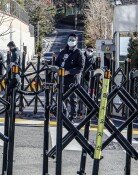'Bio Songdo’ power grid construction delayed by 3 and a half years
'Bio Songdo’ power grid construction delayed by 3 and a half years
Posted October. 17, 2023 08:08,
Updated October. 17, 2023 08:08
Concerns are growing that the investment plans of large corporations, which have committed to investing trillions of won to establish a research and production base in the Songdo bio-industrial complex in Incheon, may face disruption. Despite the need for additional power supply to operate large-scale factories and support research and development (R&D), the construction of new transmission lines has been delayed by three and a half years. As national high-tech strategic industrial complexes, such as those for semiconductors and secondary batteries, are being established one after another to secure future growth engines, there is a growing chorus of voices calling for the swift construction of a strategic network, often referred to as the 'industrial blood vessel.'
Large bio companies, including Samsung, SK, and Lotte, either relocating to the Songdo Bio Cluster or planning new establishments, have requested a 220 MW increase in power supply from the Korea Electric Power Corporation (KEPCO) to support their investment expansion. However, the completion of the Shinsiheung-Shinsongdo transmission line, vital for meeting this demand, has faced delays, pushing the expected completion date from June 2025 to December 2028. This delay is primarily due to resident protests along the power lines and Siheung City's refusal to grant permission, prompting administrative lawsuits. Such delays could pose future challenges in ensuring a reliable power supply for Songdo, which has established itself as a hub for the bio industry.
Songdo is not the sole industrial complex facing disruptions in its power grid. The Technopolis Complex in Cheongju, North Chungcheong Province, slated for a large-scale factory by SK hynix, needs additional transmission lines and substations. However, completion has been delayed by over a year due to challenges in site selection and licensing. Meanwhile, the transmission line project meant to supply power to the Kakao Data Center in Jangseong County, South Jeolla Province, hasn't even been able to submit its implementation plan for approval for seven months, owing to local civil complaints.
The challenges encountered in establishing a strategic power network are not new and often involve various stakeholders, including local governments, residents, political circles, and environmental groups. For instance, it took a decade from the planning phase to the completion of the transmission line that supplies power to Samsung Electronics' Pyeongtaek Campus, a semiconductor complex. However, the fact that KEPCO manages the entire power grid construction process inherently poses significant limitations in mediating conflicts and fostering cooperation. Although there has been an increased awareness of property rights, the compensation offered by KEPCO remains capped at 250 billion won per year, which also presents a significant obstacle.
Furthermore, KEPCO, grappling with an enormous deficit, has opted to postpone the construction of certain power plants and transmission and distribution networks in a bid to curtail costs. This move has sparked worries that the power generation grid itself could face disruptions. Most upcoming strategic industries, including semiconductors and electric vehicles, are inherently energy-intensive, and without timely investments in power infrastructure, a severe impact on these related sectors is almost certain. As a result, it becomes imperative to swiftly explore various solutions. These could include initiating a state-led power grid project akin to advanced countries such as Germany and France or encouraging private sector participation in constructing transmission and distribution networks, which KEPCO has long monopolized.







